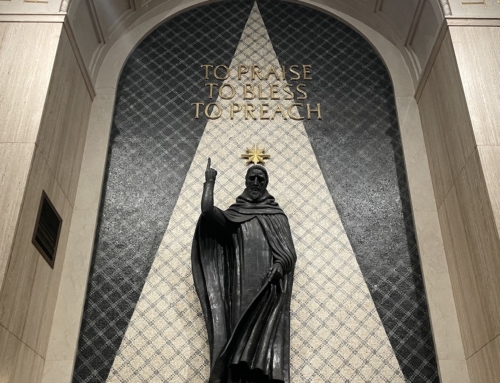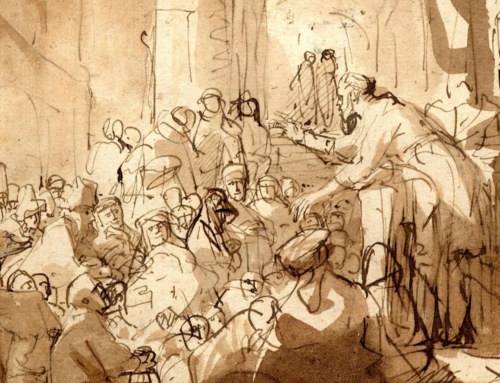The view of a mountain of dense forest exploding into fall colors may be one of the most universally moving sights on the earth. Yet, as often happens, we are hard-pressed to express exactly why it’s so moving. The impossibly harmonious cacophony of reds, oranges, and yellows is beautiful, but it’s not just the sheer quantity of beauty that affects us. Rather, it’s that such sights are much more than merely pretty, or even beautiful: they are sublime.
The sublime shocks the viewer with the physical presence of a beauty that exceeds personal taste, that is grounded in the very stuff of the world. The sublime is the inbreaking of an absolute into my subjective experience, which I can deny only by shrinking my humanity to such crabbed and cringing proportions that I can no longer recognize anything larger than myself.
But not everyone experiences the sublime in the same way. An atheist and a Christian might hike up a mountain one fall day, drinking the same water, eating the same food, sharing the same conversation, seeing the same sights, and yet experience different realities. Both of the men may stop at the peak and go silent, awed by the sublime majesty arrayed before them; nonetheless, something fundamentally different may be happening in their minds.
The atheist appreciates the sublime as one acknowledges a marvelous fact, reveling in the unique ability of the human mind to discern (or create) and delight in order amid chaos. The Christian, by contrast, may begin at the same point, but his appreciation is enlivened and elevated by thanksgiving, which is the acknowledgment of a gift. For the sublime is not simply a brute fact, but a fact-as-gift, a reality that communicates a relationship. The atheist and the Christian experience different realities because the atheist’s begins and ends with man isolated in the universe, and the Christian’s begins with man-as-recipient and ends in God-as-giver.
Christianity’s love affair with nature as the rapturous gift of God to man needs little elaboration, from the testimony of the first chapter of Genesis, to the Canticle of the Three Young Men in the Book of Daniel, to a host of saints like Francis of Assisi, Albert the Great, Pier Giorgio Frassati, or John Paul II. In nature the Christian can discover the sublime, and in the sublime he encounters the living God.
But the sublime poses a challenge to all men equally: when an absolute reality larger than our ordinary life breaks into our experience, do we respond with an attempt to close ourselves off from it and control it, or do we respond by ceding control, opening ourselves to the presence of the Other?
Walt Whitman’s famous poem “Song of Myself” exemplifies the former attitude. Commonly considered a romantic or transcendental poet, Whitman seems to reject the notion of a truly romantic or transcendental sublime that would exceed his control. Speaking of his preference for nature’s true smells over the distilled deceit of perfumes, he writes:
The atmosphere is not a perfume, it has no taste of the distillation, it is odorless,
It is for my mouth forever, I am in love with it,
I will go to the bank by the wood and become undisguised and naked,
I am mad for it to be in contact with me.
Whitman invests the simple act of breathing with a character that seems almost ecstatic, but below the powerful throb of his language we find that Whitman begins and ends with himself; the sublime does not stretch Whitman, does not invite him out to consider the presence of another. It merely provides him an opportunity to speak of his own excellence. Reality is not a gift to Whitman – it is simply himself. As he says later, “I know that the hand of God is the promise of my own.”
By contrast, the ninth-century Japanese poet Sugawara no Michizane recounts a transformative encounter with the sublime in thirty-one short syllables: Kono tabi wa / nusa mo toriaezu / tamuke yama / momiji no nishiki / kami no manimani In rough translation, it reads:
For this trip
I made no cloth offering
So I offer the mountain pass
Brocaded in red leaves
To the gods’ good pleasure
Unable or unwilling to prepare the customary traveler’s offering of a scrap of rich cloth, Michizane sees the sublime splendor of the foliage on a mountain pass and offers it to the gods instead, as a brocade far richer and a gift more beautiful than any man-made work could be. Michizane’s work reveals the heart of a man who has let the sublime break into his life and fill him with thanksgiving for the gift of reality, a gratitude that spills over into the longing for relationship with the giver.
The sublime must be at the heart of every evangelical enterprise. The Christian mission is to show with lives formed by love that the Other for whom men like Michizane longed is not just any other – it is the One Other, the Savior Jesus Christ, who entered the very brokenness of the physical world and redeemed it, making even the humblest reality an invitation to the sublime mystery of God.
Image: Kouyou







